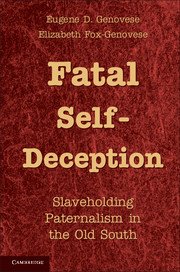2 - The Complete Household
Published online by Cambridge University Press: 05 June 2012
Summary
A complete household or community is one composed of freemen and slaves.
– William J. GraysonFredrika Bremer of Sweden encountered two slaves about to fight because one had slighted the other's master. Edward Bourne of Tennessee talked about his father's only slave, “who nearly killed another negro, because he reflected upon my father.” It was an old story. Quintilian pleaded that slaves had justification for killing free men who offended their masters. He quoted Cicero's “Defence of Milo,” a work assigned in southern schools: “Milo's slaves did what everyone would have wished his own slaves to do under similar circumstances.” An ideological imperative embedded itself in the southern slaveholder's psyche. Slaves became quasi-kin: Whites referred to “our family, white and black,” and blacks referred to “my white folks.” Indeed, throughout the world, masters, to preserve self-esteem, needed to credit every such story. They called slaves “my children,” and slaves called them “father.”
Although gentlemen in seventeenth-century Virginia considered white indentured servants household members and considered black slaves chattel, a reversal occurred in the eighteenth century. George Washington typified eighteenth-century Virginians, much as Patrick Calhoun typified nineteenth-century South Carolinians. Referring to their slaves as “my people,” they tried to know something about each. Slowly, the reality of the plantation as household induced a sensibility expressed in the language of “family.” In 1774, John Harrower, an indentured Scots tutor, wrote to his wife: “Our Family consists of the Coll., his Lady & four Children, a housekeeper, an overseer and myself all white. But how many blacks young and old only the Lord knows for I believe there is about thirty that work every day in the fields besides the servants about the house.” Anna McKnight, a poor woman in Berkeley County, Virginia, pleaded with President Thomas Jefferson, “My slaves are as My Children & if I could Procure 5 hundred dollars I can secure all I have.”
- Type
- Chapter
- Information
- Fatal Self-DeceptionSlaveholding Paternalism in the Old South, pp. 25 - 39Publisher: Cambridge University PressPrint publication year: 2011

